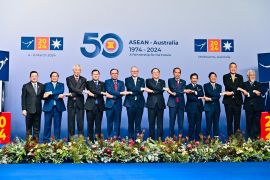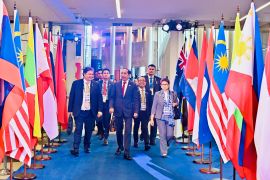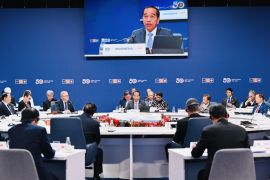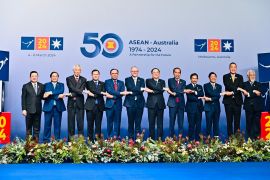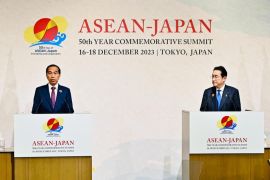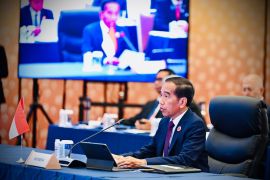"Migrant workers in ASEAN or ASEAN migrant workers who are outside the region need protection. ASEAN countries also need to open themselves to migrant workers from other member countries such as Indonesia," head of the National Agency for Placement and Protection of TKIs Abroad (BNP2TKI), Moh Jumhur Hidayat said on Friday.
Therefore, Jumhur called on ASEAN which is holding its 18th summit this weekend to discuss migrant workers` problems and open itself for employment of Indonesian workers (TKI) in its members.
The Indonesian manpower official made the statements in response to the fact that so far only three ASEAN members had recruited Indonesian migrant workers (TKIs), namely Singapore, Malaysia and Brunei Darussalam.
"I have often received complaints from employers in a number of ASEAN member countries who need TKIs but they would either not allow it or impose too tight regulations so that they could receive migrant workers from Indonesia,"Jumhur Hidayat said.
He said that it was important for ASEAN countries to employ more skilled workers from Indonesia. Indonesia had a large number of skilled workers who were ready to be placed in different ASEAN nations. Indonesian formal workers were able to compete in filling employment in the ASEAN manpower market.
"We have a lot of workers who are skilled, semi-skilled or professionals. These people are ready to be recruited in ASEAN member countries," Jumhur Hidayat said. But the problem Indonesia is facing now is that not all of the ASEAN countries are prepared to open their doors to TKIs, so Indonesian formal workers have no chance to work in those countries.
Data on the placement of Indonesian migrant workers in the Asia Pacific region in 2010 indicated that there were only three countries which had accepted TKIs.
Based on the data, Malaysia had received 116,056 Indonesian migrant workers, Singapore 39,623 and Brunei Darussalam 7,360 workers. There was no TKI recruitment in the Philippines, Vietnam, Cambodia, Myanmar, Laos and Thailand. The Philippines is the even competing with Indonesia in the placement of workers abroad.
The number of Indonesian official migrant workers in Malaysia stood at 917,332, in Singapore 106,000 and in Brunei Darussalam 50,000.
He said that the Indonesian government was launching intensive promotions of its formal workers in various countries in Europe, Australia, the United States, Canada, Japan, South Korea and others.
"Japan and countries in the Middle East are main destinations for Indonesian migrant nursery workers. They admitted that the Indonesian nurses have good skills. Demand for Indonesian nurses from these countries continue to increase every year," the BNP2TKIS chief said.
Indonesia, which placed almost one million workers in Malaysia, also called for labor protection after seeing many of its workers were physically abused or not properly paid abroad.
It is in this context that ASEAN was urged to include the migrant worker issues in its agenda during the its 18th summit in Jakarta Saturday and Monday (May 7-8, 2011)
"Violence that often happens on migrant workers is increasing and it is not overcome. Now is the right time for Indonesia as chair of ASEAN to make the issue become an important agenda," Wahyu Susilo from Migran Care said meanwhile.
"The issue must not be discussed at a ministerial level only but also at the ASEAN summit," he said. Migrant workers are an important issue requiring an immediate handling. So far, the existing policy is normative and discussions at ASEAN levels have never progressed, according to Wahyu.
Therefore, the ASEAN summit could not be declared successful if it produced no policy or commitment to migrant workers` protection. "At least there is commitment to ratifying the US convention on migrant workers," he said.
However, according to Indonesian Minister for Manpower Affairs Muhaimin Iskandar, as a labor-sending and receiving region, ASEAN had committed itself to protecting migrant workers.
ASEAN in its summit, he said, is expected to issue a recommendation on protection of migrant workers. The recommendation would deal among others with occupational security and protection, and social insurance.
He said relevant ministries of each ASEAN member state was in the process of finalizing the draft of the recommendation. He said the ASEAN summit would issue a recommendation consisting of three points namely security for workers during migration, security and protection during working and social security or insurance for workers.
Muhaimin said that his ministry was also preparing a bill on protection of domestic helpers and would soon bring it to a meeting of relevant ministries for discussion. Once the bill was passed into law, it would provide basic protection to domestic helpers, including guarantee of no violence and rights to fair employment and protection, he said.(*)
HAJM/A014
Reporter: Andi Abdussalam
Editor: Aditia Maruli Radja
Copyright © ANTARA 2011
